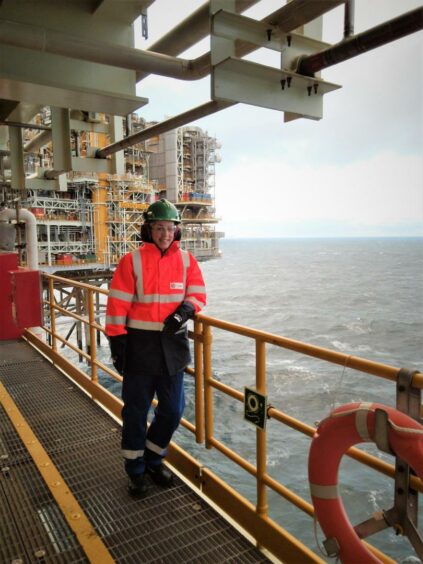
North Sea operators have been told to improve after new figures exposed the number of invoices that are not being paid on time.
The North Sea Transition Authority’s (NSTA) new supply chain report shows that 29% of the 475,000 invoices paid by UKCS operators last year took over 30 days to process.
In the most “egregious” of cases, Andy Samuel, NSTA chief executive, says the industry regulator is “happy” to step in and look through the data.
The remaining 71% of the 475,000 invoices were paid within 30 days, while 98% were completed without dispute.
But while the lack of disagreements is “encouraging”, the NSTA says there is “room for improvement” on payment speed.
Speaking at the Offshore Energies UK conference in Aberdeen on Monday, Mr Samuel said: “Prompt payment is something that’s being raised numerous times. We are very happy to follow up where there are particularly egregious cases, and when we do, we look at the data carefully.
“This year we provided the operators with their own benchmarks so they could see how they stack up.”
He said that, of the invoices last year, “70% paid within 30 days – so 30% were not”.
Mr Samuel added: ” Some of those were well over 60 days, so again, please, if you’re an operator, do better in this space. It’s really important for the supply chain.”
In good news for the supply chain, the NSTA report, which is being launched at the Southern North Sea Conference, indicates at least £5 billion of contracts are either being tendered now or in the very near future.
It follows a brutal couple of years for the service sector, which felt the bite of the Covid pandemic and subsequent industry downturn particularly acutely.
And though prices have rallied in recent weeks, driven by supply shortage and an uptick in demand, previous cycles show it takes a while for the benefits to filter down to suppliers.

Mr Samuel said: “There’s global competition and I want our supply chain to be at the forefront of this, at a very exciting time.
“I mentioned the supply chain quite a bit because there’s a tendency sometimes to focus on the big operators, and yes, they’re doing a great job.
“But actually, the reality is that most of the jobs, the skills and a lot of the innovation is actually going to come from the supply chain – it always has done and it’s 85% of the workforce.”
In order to promote good procurement and contracting behaviours within the industry, while also supporting the development of a competitive supply chain, the NSTA has for primary tools.
Introduced in 2018, supply chain action plans provide evidence that operators are maximising the value of projects by engaging with suppliers.
Last year the NSTA 13 SCAPs for decommissioning programmes worth £1.4bn, and nine for field development plans with a value of £3.6bn.
The NSTA has also set out how companies should collaborate with their contractors through stewardship expectation – payment of suppliers in a timely manner is a key facet.
In order to give suppliers a picture of the opportunities on the horizon, the energy pathfinder portal was updated last year.
It currently lists 140 major UK North Sea energy projects, including exploration and production.
Finally, stewardship reviews allow the NSTA to underline the expectations, SCAPs and the pathfinder the operators, and allow feedback the other way.
Last year’s 12 studies highlighted flexible and innovative contracting practices, a stimulator of activity amid the pandemic.
A range of issues cropped up too though, and it was found operators continue to prioritise the lowest cost, technically feasible proposal when awarding contracts.
And the NSTA says industry must shift “at pace” to value-adding contracting, which delivers superior results and encourages investment in new skills and technologies.
Stuart Payne, director of supply chain, decommissioning and HR at the regulator, said: “This new report should give suppliers cause for optimism, with billions of pounds of investment coming their way in the next few years.
“Encouragingly, it also highlighted fantastic examples of operators and service companies working in collaborative and innovative ways to get projects off the ground.
“However, industry can still improve in some key areas, such as turnaround times for payments. The NSTA will continue to use its regulatory powers, suite of tools and influence to add value and maintain a strong supply chain.
“This all matters because a thriving and well supported supply chain is vital for the UK to meet our energy security and energy transition needs.”
Katy Heidenreich, supply chain and operations director at trade body Offshore Energies UK, said: “We are committed to supporting the UK’s world leading companies to drive the technology and innovation needed to deliver energy security and net zero emissions by 2050. The UK needs to be a good place for supply chain companies to invest and do business and our Supply Chain Principles define good procurement practice and enable us to maintain and strengthen our supply chain. Our recent Working as One Survey measures adherence to these
Principles and indicates the industry is collectively taking action through OEUK task groups focusing on fair sharing of risk and reward, driving innovation and improving payment performance.”
Recommended for you


 © Supplied by Offshore Energies UK
© Supplied by Offshore Energies UK © Shutterstock
© Shutterstock © Supplied by OGUK
© Supplied by OGUK